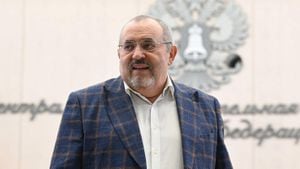Friedrich Merz, the Union's chancellor candidate, delivered a contentious final campaign speech on Saturday, showcasing the party's unity as they rally before the 2025 Bundestag election. Yet amid the show of strength, his comments stirred public outrage, casting shadows on the political atmosphere.
During the Union's concluding event at Munich's Löwenbräukeller, Merz made headlines with remarks linking leftist demonstrators to historical instances of right-wing violence. "Where were all those out there—Antifa and 'Against the Right'—when Walter Lübcke was murdered by a right-wing extremist?" he questioned, pointing to the killing of the CDU politician who was shot by Stephan Ernst in 2019, emphasizing what he deemed to be the inadequate response from leftist groups.
His comments did not end there. Merz declared, "Left is over! There is no left majority and no left politics anymore in Germany!" He asserted his commitment to represent the majority who, as he put it, "still possess all their faculties," dismissing the left as mere "green and left-wing nuts" who have no connection to mainstream society.
Such fiery rhetoric has drawn the ire of many, particularly from opposition parties. Lars Klingbeil, leader of the SPD, took to social media to criticize Merz's divisive statements. He remarked on X, “Friedrich Merz deepened the divisions within the democratic center of our country at the last minute before the election.” This sentiment was echoed by Matthias Miersch, the SPD's Secretary General, who described Merz's speech as the low point of the campaign, branding him as “a mini-Trump” for his polarizing approach.
Commentators on social media expressed their dismay as well, highlighting the irony of his claims. For example, citing historical protests, they pointed out the significant public turnout against far-right violence following Lübcke’s murder, illustrating the disconnect between Merz's assertions and the recorded civic engagement.
The political fallout from Merz's speech extends beyond rhetoric. With events like those organized across major German cities, against far-right policies, the political dynamics are shifting. On the same day as Merz's speech, protests saw thousands participating. For example, Hamburg alone counted 40,000 demonstrators rallying against right-wing extremism. Critics of Merz were quick to highlight the hypocrisy of his comments, especially since they disregarded these public expressions of condemnation against extremist violence.
Video footage and eyewitness accounts from the Munich gathering show the audience's enthusiastic responses to Merz’s incendiary remarks. His emphasis on traditional values, centered on middle-class concerns, was met with loud applause and standing ovations from his supporters, effectively rallying them for the upcoming election.
Nonetheless, not everything was harmonious. Outside the venue, counter-protesters gathered to express their opposition to Merz’s migration policies, symbolically dismantling a cardboard wall to criticize the Union's stance and its ties with the far-right AfD party. This juxtaposition of supporters inside and dissenters outside highlighted the deepening divides within German political discourse.
Merz’s approach also included critiques of the current coalition government, particularly targeting Economy Minister Robert Habeck and his energy policies, which he labeled as overly focused on minutiae, and non-substantial talks about heating regulations. During his speech, Merz pointedly alluded to Abeck’s handling of economic issues, jesting, “Have you ever heard of any other economy minister bothering over which heaters to install?” This jab was received with laughter and cheers from the crowd.
Adding more tension to the atmosphere is Merz’s controversial pivot away from earlier statements, wherein he committed to avoiding any legislative agreements with the AfD. He conceded having previously broken his promise, now justifying these changes by stating the need to pass relevant laws following tragic events, such as the attack targeted at Lübcke. Yet, he remained firm on excluding the right-wing party from any future coalition.
Merz's final campaign address is emblematic of the fraught political atmosphere as Germany approaches the elections. His comments may appeal to some, but they have undeniably aggravated tensions with substantial parts of the electorate, as evidenced by the notable responses from political opponents and the public.
Despite the backlash, the Union party members left the event confidently, bolstered by their show of camaraderie during Merz's speech. The forthcoming elections will determine if the political strategy wielded by Merz succeeds or if the divisions he has exacerbated lead to repercussions for the Union on polling day.



